Choosing Commercial Hotel Door Locks: Key Considerations and Cost-Effective Solutions
Installing brand-new commercial-grade locks across your hotel is expensive, but guests are increasingly looking for tech-enabled stays and there’s a need for greater operational efficiency across the industry.
With a lot of choice out there, you need a clear picture of what will have the biggest impact on your ability to mitigate the labor shortage and tight profit margins, and how you can attract a target audience that’s searching for contactless experiences and independence throughout their stay.
That’s why in this article, we look at:
The main types of hotel door lock
The key factors to consider when choosing a new hotel lock
The three top brands
How to upgrade your locks in the most cost-efficient way
Types of commercial-grade hotel room locks .
Broadly speaking, there are two types of hotel door locks—traditional, mechanical ones and smart locks which are WiFi or Bluetooth-enabled. In this section, we look at the pros and cons of each.
Magnetic stripe locks
A magnetic stripe (or magstripe) lock uses a magstripe reader, where the guest swipes or inserts their magstripe keycard.
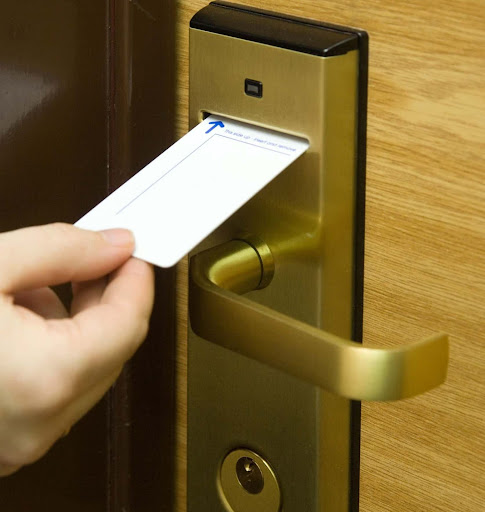
Magstripe systems are easy and cost-efficient to implement and simple for guests to use. However, while the lock itself doesn’t require a lot of maintenance, the cards must frequently be replaced as they can stop working when near mobile phones. Faulty keycards are a big source of guest frustration and create extra work for your front desk.
Pin code
Hotel door locks with keypads can be programmed manually or connected to a hotel system that tells them which codes to accept in real-time.
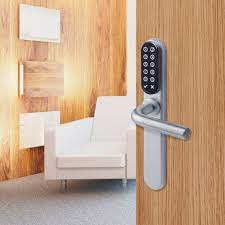

These keypad locks are great for guest independence as people can check in without visiting the front desk. However, touchscreen models can be tricky to wake up from their standby mode, and if they’re not fully integrated with a remote access management system, you need to manually update the codes for each stay.
RFID
Radio Frequency Identification/RFID locks only need to have a card held near them to unlock. The cards have a chip in them that transmits information through electromagnetic waves for the lock to cross-check.
RFID technology costs more than magstripe systems and keypads, but it’s more reliable and better for guests because it’s easier to use (guests often have to swipe or insert magstripe keycards multiple times for them to function).
Some RFID locks are Bluetooth Low Energy (BLE)-enabled which means they use Bluetooth to connect.
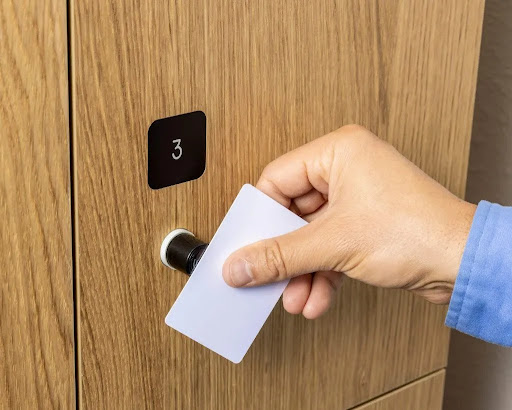

BLE (Bluetooth Low Energy)
Because BLE locks improve the guest experience and allow you to build an integrated access system, major hotels prefer them. This gives them a big advantage over smaller operators, like boutique hotels, who often see overhauling their locks as prohibitively expensive.
With the latest cutting-edge technology, however, this is no longer a problem. Learn more in the next section.
Operto Boost
Operto Boost allows you to gain the benefits of a BLE access system without the costs. By adding a BLE chip to your existing hardware, you can have keyless entry with locks you’d otherwise have to strip out and replace. In fact, it’s so fast and easy to implement, you can handle the upgrade yourself.
Later in the article, we’ll explore why it could be the best solution if you’re looking to become a tech-enabled hotel.
Factors to consider when choosing hotel door locks
The best hotel door locks facilitate a great experience for your guests and teams, integrate with your central tech stack, and make a range of digital and automation solutions possible. In this section, we look more in-depth at the factors you need to consider to find a solution that works for you.
Cost
BLE locks can be expensive, but you need to consider more than just the upfront costs of installation when choosing a new solution. For example, with some brands, you’ll have recurring maintenance fees.
Also, when you fit any new piece of hardware onto a door, you may find that it no longer meets regulation fire codes. This could mean having to replace the hinges or handle, or it could mean having to replace the door entirely.
Security
RFID locks have no physical encoder, and access permissions are all centralized, so you can remotely grant or revoke access at any time. Meanwhile, mobile access has an additional layer of security since the digital key is protected behind a password or face ID.
So, while your keycard could get stolen, if someone steals your phone, they’re not still not going to gain access to a room or common area without first cracking your password.
Ease of management
Manual locking systems add to your front desk’s workload. From swiping magstripe cards each time they’re issued, to replacing keycards mid-stay, to generating a pin code for every new guest (which Operto can automate for you), check-in is incredibly time-consuming.
But with a complete, automated flow that includes digital check-in and verification, and is enhanced by mobile key, that front desk workload is cut right down.
Plus, through integrated management software like Operto Tech, you’ll have complete visibility over real-time occupancy and have logs of who accessed which door at what time, which you can use to better understand how staff and guests move around your hotel.
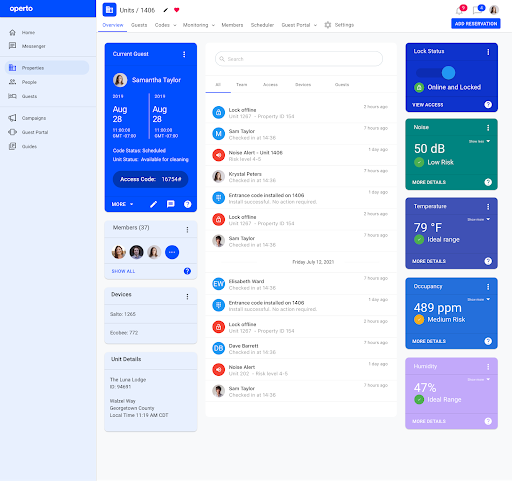

Guest experience
For the vast majority of hotel guests, mobile key access is an obvious winner. Rather than having to join a long line of arrivals to collect physical keycards, they can simply arrive and navigate around the hotel independently.
With Operto Guest, digital check-in works like this:
- Upon booking, guests receive a text, email, or link to a branded web app with all the information they need about their stay.
- Shortly before their scheduled check-in time, guests are guided through the online process; once their security deposit is confirmed, their access details are activated.
- Guests arrive and independently use their mobile key to access their room—no staff required.
An integrated solution also gives you extra opportunities to upsell. Since the mobile key is within the same web app as your digital guide, you can easily present guests with a clear overview of everything you offer, from room upgrades to fine dining and more.
Here’s the kind of information you can share with guests as you provide them with the autonomy of online check-in and digital access:
- Directions
- Parking information
- WiFi access details
- A description of all your amenities
- Recommendations on what to do
- Add-on services
Ease of installation
Fitting new digital locks is more complicated than fitting mechanical locks, especially when you’re looking to replace a wired system.
But by retrofitting the technology onto your existing locks with Operto Boost, it’s quick and easy. Our chips work with different types of locks, wireless and hardwired, allowing you to manage access across your entire hotel.
Which door lock is best for your hotel?
Looking for some specific door lock recommendations? Here are three brand leaders you should consider.
ASSA ABLOY
ASSA ABLOY, which is the parent company of Yale locks, has been manufacturing highly secure mechanical locks for decades. If you’re looking for a traditional mortise lock or pin code lock, ASSA ABLOY manages a fantastic range for you to explore.
Their BLE locks, which integrate with apps so you can manage access and view room status, are also high quality.
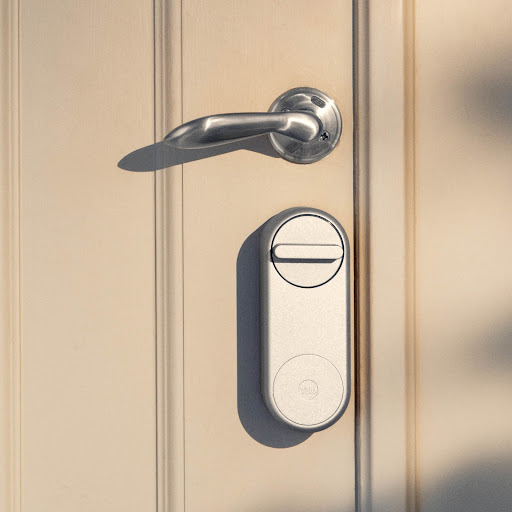

Salto
Salto provides a range of BLE locks and access solutions powered by the cloud. Guests can check in through an app and you can manage access from wherever you are, with software that integrates with your PMS and building management systems.
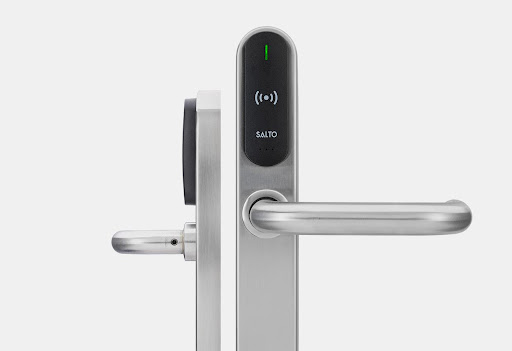

Operto Boost
If you’re looking to access the benefits of a digital locking system but wish to keep your existing doors and locks, Boost technology makes this possible. Working with your current lock type, the BLE smart chip is inserted so you can instantly start offering contactless access to guests.
The entire process can be completed in minutes, and could save you literally thousands of dollars in upfront costs, as well as maintenance fees, and supply chain delays.
Upgrading your hotel door locks without increasing your costs
When you’re choosing a hotel door lock system, there are five main factors you need to balance. You’ll want to:
- Ensure high-level of security and access management
- Provide the modern experience guests expect
- Take pressure off of understaffed teams
- Find a solution that is easy to install and maintain
- Keep costs down
BLE locks fit a number of the key criteria, but they’re also expensive. Operto Boost allows you to upgrade your locks without high upfront costs or hidden fees. From here, you can access a range of integrated solutions that improve operations and the guest experience.
Install the Boost Smart Chip and give guests digital access without replacing your existing locks.
Learn more about Operto Boost
Frequently asked questions about hotel door locks
What is the cheapest door lock for a hotel room?
Traditional pin codes are widely regarded as the most affordable locking mechanism. But with Operto Boost, you can turn your existing hotel door locks into BLE locks for a fraction of the price of installing new ones. This lets you improve security and facilitates mobile self check-in without switching out any door hardware.
What door locks do hotels use?
Hotels use either mechanical door looks, such as pin code locks and magstripe systems, or electronic door looks like RFID and Bluetooth locks. Popular manufacturers include Dormakaba, ASSA ABLOY, Onity, Salto, Saflok, and Miwa.